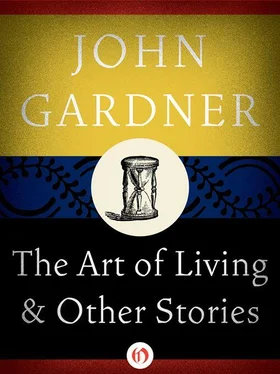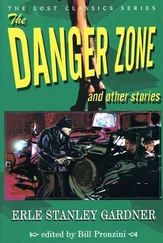John Gardner - The Art of Living - And Other Stories
Здесь есть возможность читать онлайн «John Gardner - The Art of Living - And Other Stories» весь текст электронной книги совершенно бесплатно (целиком полную версию без сокращений). В некоторых случаях можно слушать аудио, скачать через торрент в формате fb2 и присутствует краткое содержание. Год выпуска: 2010, Издательство: Open Road Media, Жанр: Современная проза, на английском языке. Описание произведения, (предисловие) а так же отзывы посетителей доступны на портале библиотеки ЛибКат.
- Название:The Art of Living: And Other Stories
- Автор:
- Издательство:Open Road Media
- Жанр:
- Год:2010
- ISBN:нет данных
- Рейтинг книги:4 / 5. Голосов: 1
-
Избранное:Добавить в избранное
- Отзывы:
-
Ваша оценка:
- 80
- 1
- 2
- 3
- 4
- 5
The Art of Living: And Other Stories: краткое содержание, описание и аннотация
Предлагаем к чтению аннотацию, описание, краткое содержание или предисловие (зависит от того, что написал сам автор книги «The Art of Living: And Other Stories»). Если вы не нашли необходимую информацию о книге — напишите в комментариях, мы постараемся отыскать её.
The Art of Living: And Other Stories — читать онлайн бесплатно полную книгу (весь текст) целиком
Ниже представлен текст книги, разбитый по страницам. Система сохранения места последней прочитанной страницы, позволяет с удобством читать онлайн бесплатно книгу «The Art of Living: And Other Stories», без необходимости каждый раз заново искать на чём Вы остановились. Поставьте закладку, и сможете в любой момент перейти на страницу, на которой закончили чтение.
Интервал:
Закладка:
Something blocked the light coming in through the cow-barn window from the west, and he turned his head, glancing up.
“You all right there, Jackie?” his uncle Walt said, bent forward, near-sightedly peering across the gutter.
He nodded and quickly wiped his wrist across his cheeks. He moved his hands once more to the cow’s warm teats.
A few nights later, when he went in from chores, the door between the kitchen and livingroom was closed, and the house was unnaturally quiet. He stood a moment listening, still holding the milk pail, absently fitting the heel of one boot into the bootjack and tugging until the boot slipped off. He pried off the other, then walked to the icebox in his stocking feet, opened the door, carried the pitcher to the table, and filled it from the pail. When he’d slid the pitcher into the icebox again and closed the door, he went without a sound, though not meaning to be stealthy, toward the livingroom. Now, beyond the closed door, he heard voices, his sister and mother, then one of his aunts. He pushed the door open and looked in, about to speak.
Though the room was dim, no light but the small one among the pictures on the piano, he saw his father at once, kneeling by the davenport with his face on his mother’s lap. Phoebe was on the davenport beside their mother, hugging her and him, Phoebe’s cheeks stained, like her mother’s, with tears. Around them, as if reverently drawn back, Uncle Walt, Aunt Ruth, and their two children sat watching, leaning forward with shining eyes. His father’s head, bald down the center, glowed, and he had his glasses off.
“Jackie,” his aunt called sharply, “come in. It’s all over. Your dad’s come home.”
He would have fled, but his knees had no strength in them and his chest was wild, churning as if with terror. He clung to the doorknob, grotesquely smiling — so he saw himself. His father raised his head. “Jackie,” he said, and was unable to say more, all at once sobbing like a baby.
“Hi, Dad,” he brought out, and somehow managed to go to him and get down on his knees beside him and put his arm around his back. He felt dizzy now, nauseated, and he was crying like his father. “I hate you,” he whispered too softly for any of them to hear.
His father stayed. He worked long days, in control once more, though occasionally he smoked, pacing in his room nights, or rode off on his motorcycle for an hour or two, and seldom smiled. Nevertheless, in a month he was again reciting poetry for schools and churches and the Grange, and sometimes reading Scripture from the pulpit Sunday mornings. Jack, sitting rigid, hands over his face, was bitterly ashamed of those poems and recitations from the Bible. His father’s eyes no longer flashed, he no longer had the style of an actor. Even his gestures were submissive, as pliant as the grass. Though tears ran down Jack Hawthorne’s face — no one would deny that his father was still effective, reading carefully, lest his voice should break. “Tomorrow’s Bridge” and “This Too Will Pass”—Jack scorned the poems’ opinions, scorned the way his father spoke directly to each listener, as if each were some new woman, his father some mere suffering sheep among sheep, and scorned the way Phoebe and his mother looked on smiling, furtively weeping, heads lifted. Sometimes his father would recite a poem that Jack himself had written, in the days when he’d tried to write poetry, a comic limerick or some maudlin piece about a boy on a hill. Though it was meant as a compliment, Jack’s heart would swell with rage; yet he kept silent, more private than before. At night he’d go out to the cavernous haymow or up into the orchard and practice his French horn. One of these days, he told himself, they’d wake up and find him gone.
He used the horn more and more now to escape their herding warmth. Those around him were conscious enough of what was happening — his parents and Phoebe, his uncles, aunts, and cousins, his mother’s many friends. But there was nothing they could do. “That horn’s his whole world,” his mother often said, smiling but clasping her hands together. Soon he was playing third horn with the Batavia Civic Orchestra, though he refused to play in church or when company came. He began to ride the Bluebus to Rochester, Saturdays, to take lessons from Arcady Yegudkin, “the General,” at the Eastman School of Music.
Yegudkin was seventy. He’d played principal horn in the orchestra of Czar Nikolai and at the time of the Revolution had escaped, with his wife, in a dramatic way. At the time of the purge of Kerenskyites, the Bolsheviks had loaded Yegudkin and his wife, along with hundreds more, onto railroad flatcars, reportedly to carry them to Siberia. In a desolate place, machine guns opened fire on the people on the flatcars, then soldiers pushed the bodies into a ravine, and the train moved on. The soldiers were not careful to see that everyone was dead. Perhaps they did not relish their work; in any case, they must have believed that, in a place so remote, a wounded survivor would have no chance against wolves and cold weather. The General and his wife were among the few who lived, he virtually unmarked, she horribly crippled. Local peasants nursed the few survivors back to health, and in time the Yegudkins escaped to Europe. There Yegudkin played horn with all the great orchestras and received such praise — so he claimed, spreading out his clippings — as no other master of French horn had received in all history. He would beam as he said it, his Tartar eyes flashing, and his smile was like a thrown-down gauntlet.
He was a barrel-shaped, solidly muscular man, hard as a boulder for all his age. His hair and moustache were as black as coal except for touches of silver, especially where it grew, with majestic indifference to ordinary taste, from his cavernous nostrils and large, dusty-looking ears. The sides of his moustache were carefully curled, in the fashion once favored by Russian dandies, and he was one of the last men in Rochester, New York, to wear spats. He wore formal black suits, a huge black overcoat, and a black fedora. His wife, who came with him and sat on the long maple bench outside his door, never reading or knitting or doing anything at all except that sometimes she would speak unintelligibly to a student — Yegudkin’s wife, shriveled and twisted, watched him as if worshipfully, hanging on his words. She looked at least twice the old man’s age. Her hair was snow white and she wore lumpy black shoes and long black shapeless dresses. The two of them would come, every Saturday morning, down the long marble hallway of the second floor of Killburn Hall, the General erect and imperious, like some sharp-eyed old Slavonic king, moving slowly, waiting for the old woman who crept beside him, gray claws on his coat sleeve, and seeing Jack Hawthorne seated on the bench, his books and French horn in its tattered black case on the floor beside him, the General would extend his left arm and boom, “Goot mworning!”
Jack, rising, would say, “Morning, sir.”
“You have met my wife?” the old man would say then, bowing and taking the cigar from his mouth. He asked it each Saturday.
“Yes, sir. How do you do?”
The old man was too deaf to play in orchestras anymore. “What’s the difference?” he said. “Every symphony in America, they got Yegudkins. I have teach them all. Who teach you this? The General! ” He would smile, chin lifted, triumphant, and salute the ceiling.
He would sit in the chair beside Jack’s and would sing, with violent gestures and a great upward leap of the belly to knock out the high B’s and C’s— Tee! Tee! — as Jack read through Kopprasch, Gallay, and Kling, and when it was time to give Jack’s lip a rest, the General would speak earnestly, with the same energy he put into his singing, of the United States and his beloved Russia that he would nevermore see. The world was at that time filled with Russophobes. Yegudkin, whenever he read a paper, would be so enraged he could barely contain himself. “In all my age,” he often said, furiously gesturing with his black cigar, “if the Russians would come to this country of America, I would take up a rifle and shot at them— boof! But the newspapers telling you lies, all lies! You think them dumb fools, these Russians? You think they are big, fat bush-overs?” He spoke of mile-long parades of weaponry, spoke of Russian cunning, spoke with great scorn, a sudden booming laugh, of Napoleon. Jack agreed with a nod to whatever the General said. Nevertheless, the old man roared on, taking great pleasure in his rage, it seemed, sometimes talking like a rabid communist, sometimes like a fascist, sometimes like a citizen helplessly caught between mindless, grinding forces, vast, idiot herds. The truth was, he hated both Russians and Americans about equally, cared only for music, his students and, possibly, his wife. In his pockets, in scorn of the opinions of fools, he carried condoms, dirty pictures, and grimy, wadded-up dollar bills.
Читать дальшеИнтервал:
Закладка:
Похожие книги на «The Art of Living: And Other Stories»
Представляем Вашему вниманию похожие книги на «The Art of Living: And Other Stories» списком для выбора. Мы отобрали схожую по названию и смыслу литературу в надежде предоставить читателям больше вариантов отыскать новые, интересные, ещё непрочитанные произведения.
Обсуждение, отзывы о книге «The Art of Living: And Other Stories» и просто собственные мнения читателей. Оставьте ваши комментарии, напишите, что Вы думаете о произведении, его смысле или главных героях. Укажите что конкретно понравилось, а что нет, и почему Вы так считаете.












